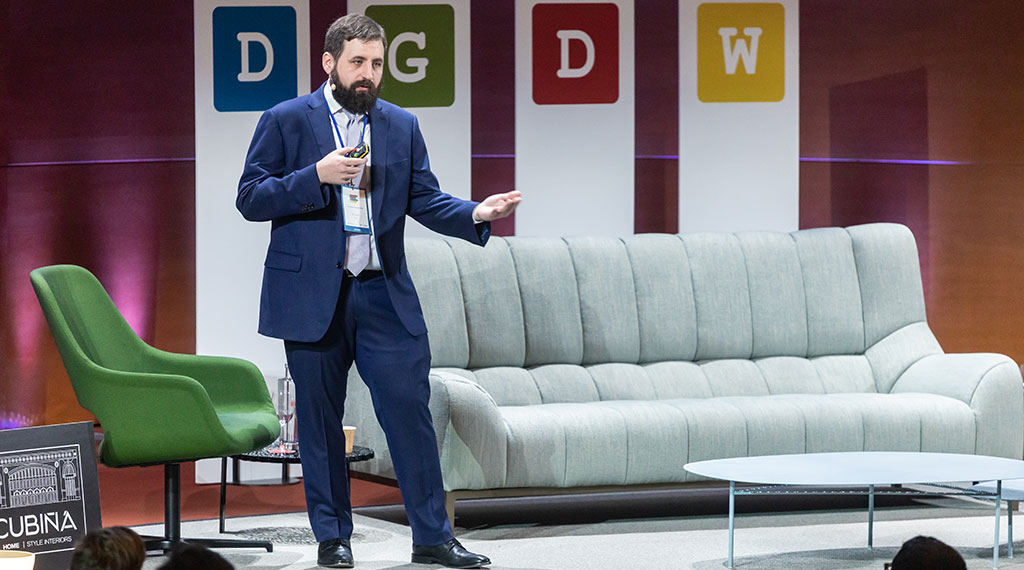Stories
The push beyond profit
Doing Good Doing Well 2020 conference looks at business sustainability and purpose
Bill Nauman, a reporter and producer for the Financial Times’ Moral Money platform, spoke at Doing Good Doing Well.
Photo: Roger Rovira
March 4, 2020

As the climate emergency and global inequalities lend new impetus to calls for change, companies and individuals must find new ways to do business.
That was one of the conclusions of IESE’s 17th annual Doing Good Doing Well conference, organized by MBA students, which took place this week on the Barcelona campus. The event featured keynote speeches from B Lab Spain, the World Economic Forum and the Financial Times, along with panels covering issues ranging from reducing plastic waste, to developing the circular economy, to finding new transportation solutions. There were also a number of sessions related to impact investing and sustainable finance.
Throughout, speakers offered their takes on changing attitudes toward business and money, and stressed that climate change and the failures of current economic models have created a new urgency to act.
“We have to build an economic system in the next years that will heal our wounded societies,” Silvio Dulinsky, member of the Executive Committee of the World Economic Forum, said in his keynote speech.
Money redefined
Billy Nauman of the Financial Times compared the focus on environmental, social, and governance (ESG) issues to what tech once was in the business world. “In the 80’s and 90’s, tech was sort of siloed off. Now tech is everything. And sustainability is going towards that. You can’t talk about business without talking about climate and sustainability.”
Where the traditional business view of money accepted it as amoral, times are changing. Nauman referenced the decision by the U.S. Business Roundtable to abandon its stance on shareholder primacy. “They’re ditching the shareholder mantra. It’s more than just profits. Businesses are going to have to think about stakeholders, that means, the environment, society, etc. The traditional view of money and investing no longer works in today’s business world.”
Xavi Ginesta, chairman of Voxel Group and managing director at Conscious Capitalism Foundation, also commented on changing attitudes toward money, increasingly viewed as necessary for business but not its end purpose. “Essentially conscious capitalism has to do with injecting consciousness into business,” he said. “The way of doing that is injecting purpose. When you think of business as something that has a higher purpose, then all of the sudden things change.”
“This new compass is purpose,” agreed Raimon Puigjaner, president of B Lab Spain Foundation. “Purpose is pushing us beyond profit.”
Pressures to do good
Enrique Alvarado, fund manager of Bamboo Capital Partners, highlighted the role demographics have played in this business mindset shift. “Millennials have a different way of thinking. They see life differently. Baby boomers were focused on making wealth and growing. Millennials are more engaged on how they are living life in the moment. And this is changing the way people are investing. It is going from investing for wealth towards investing for good.”
Citing a chart which evidenced approximately 50% of all consumers between the ages of 18 and 34 said they have actively stopped buying a company’s food or drink products after discovering they are not environmentally responsible, Nauman expanded on the influence of the shift in demographics that “companies have to wake up to. You can no longer separate profits from ESG. If you want to increase profits, it relies explicitly on environmental responsibility.”
Besides the indirect pressures from consumers, protestors are now holding asset managers and investment funds more responsible as well. “They aren’t just going after the companies that do the pipelines, for example. They’re going after the companies who financed the pipelines”, Nauman affirmed. There’s opportunity for ESG, but there’s also this added pressure.
Fernando de Roda, co-founder and managing partner of Greenward Partners, was of the opinion that investors are the main force driving this change. Companies are doing their part, and some are taking the lead. For example, Amazon has committed to being carbon neutral by 2040. “If a company this big can do it, why not other companies? Investors want to know the company targets and what specific actions are being taken year after year to achieve these things,” he stated.
The importance of individual action
But beyond of the world of asset managers and investment funds, is there something we can do to “do good and do well”? Co-founder and Managing Partner at SI Capital Sebastian Waldburg encouraged individuals to send a message to their bank managers or pension managers. “Tell them: ‘This is what you should invest in’. It’s up to all of us to make individual statements. Even if we only have a little money, to give that message to them is important.”
Alvarado agreed that having an impact when it comes to investing doesn’t have to only mean putting down money. “We all need to take the risk of investing. Even if we don’t have savings. Investment is not just about wealth; it’s also about time, connections, energy… And these aspects also count for a lot.”
Randall Krantz, who co-founded the Responsible Business Club as an MBA candidate at IESE, said that work-related activism in can take place at many different levels: among shareholders, employees and by profession. Beyond that, each individual can make a choice in their personal lives, by voting, being optimistic about the possibility of change, and committing to taking action.
“Be an activist, not just in your spare time. Be active and be an activist in your workplace and in your life and take this as something you believe in really, really deeply,” he said.


